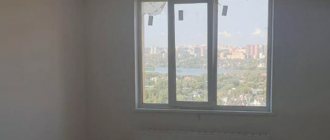The purchase of residential real estate is regulated by the provisions of the Civil Code of the Russian Federation, Law of the Russian Federation dated 02/07/1992 No. 2300-1 “On the Protection of Consumer Rights” and Federal Law dated December 30, 2004 No. 214-FZ “On participation in shared construction of apartment buildings and other real estate…”. These rules require the developer to transfer the property to the buyer on the terms specified in the contract.
The text of the agreement specifies the cost, terms of transfer, characteristics of the object and warranty obligations after delivery of the house. This article will help you understand the responsibility of the developer, establish a warranty period for apartments, and competently submit a claim under an equity participation agreement in construction.
Important! If you yourself are dealing with your own case related to the developer’s warranty obligations, then you should remember that:
- Each case is unique and individual.
- Understanding the basics of the law is useful, but does not guarantee results.
- The possibility of a positive outcome depends on many factors.
Will defects missed during acceptance of the apartment be corrected under warranty?
Only if defects identified after signing the acceptance certificate will be considered a warranty case. It should be noted that not always, as part of the inspection before signing the deed, the buyer has a full opportunity to inspect his apartment and find all the shortcomings.
For example, if a new building is rented out in the summer, it is impossible to evaluate the operation of the heating system and the quality of the interpanel seams, which should protect the apartments from the penetration of cold air.
At the stage of handing over the keys, not all new buildings are connected to hot water supply. That is, apartment owners do not have the opportunity to assess the pressure of warm water and its temperature. If apartments are transferred with a fine finish, it is also impossible to identify the presence of hidden defects, for example, mold - they are hidden by wallpaper, tiles or other finishing materials.
Unfortunately, it is not immediately possible to detect the smell of ammonia or formaldehyde, which indicate a violation of construction technology. Such situations do not occur often, but the St. Petersburg market of new buildings knows several similar cases.
On average, a buyer is given no more than one and a half hours to inspect an apartment. If the owner does not have experience in accepting apartments and does not resort to the help of experts who specialize in identifying defects in new buildings, the time allocated for inspection may not be enough to detect all defects.
Therefore, it is important to find out in advance what is included in the warranty for a new apartment, and during acceptance, focus on identifying non-warranty defects, so that after signing the act you do not have to correct them at your own expense.
Circumstances excluding the developer's liability
The aforementioned federal law clearly defines the developer’s area of responsibility. As a rule, we are talking about defects that are of a capital nature. If a construction company refuses to fulfill its obligations, it may, in accordance with the provisions of Part 7, Article 7 of Federal Law No. 214-FZ, explain its actions for one of the following reasons:
• Natural wear and tear, as well as deterioration of operational parameters due to the end of the estimated period of use.
• Violation of the rules for the operation of premises that are classified as general use, as well as improper use of property.
• Breakdown of equipment or structural elements that, during the delivery of the object, were accepted without filing a claim under the acceptance certificate, or damaged by the user himself.
• Violation of the rules of operation, installation or use of plumbing equipment and household devices.
• Emergency cases that are associated with heating, sewer, ventilation, gas, drainage and other systems, and occurred due to the actions of residents.
Thus, the developer’s warranty obligations do not include, for example: replacement of broken doors and glass, repair of the access control system and video devices, repair of common areas, replacement of lost lamps and chandeliers, yard landscaping damaged by vehicles, roof leakage in the event if the roof or part of it belongs to the apartment and the residents carried out repairs or alterations; if, after acceptance, the owner independently replaced certain components (for example, heating radiators). There is an opinion that if the owners of an apartment have gutted the walls or installed floor-to-ceiling windows, then in this case the warranty is removed from the entire house, since the vapor barrier was broken and the residents themselves are to blame for this.
Warranty for new construction: 5 years or 3 years?
The warranty period for a new apartment is regulated by 214-FZ. Engineering and technological equipment is guaranteed by the developer for three years. This category includes defects:
— Electricity, gas and water supply
— Ventilation system
— Elevators
- Heating systems
The warranty on the building structure is five years and includes the elimination of defects:
— Stan
— Facades
— Load-bearing structures
— Double-glazed windows
The warranty period is calculated from the date of signing the apartment acceptance certificate. That is, for each property owner the end date of the guarantee is different, and it does not matter how much has passed since the house was put into operation.
What do the developer's warranty obligations mean?
During direct operation, shortcomings and deficiencies are often revealed - leaking roofing, cracks and leaks, mold, initially non-functioning engineering equipment, obvious construction mistakes. There are enough reasons to make claims.
Important!
The scope of warranty obligations in relation to the property is specified in Article 7 of the Federal Law of December 30, 2004 No. 214-FZ “On participation in shared construction...”.
The object transferred to the shareholder must comply with the terms of the concluded agreement presented to the buyer of the project, general technical standards and urban planning regulations. Full responsibility for the quality and safety of housing lies with the developer.
The guarantee for an apartment in a new building is established in accordance with Law No. 214-FZ, and when concluding an agreement for participation in shared construction, the parties can establish an increased duration of the guarantee obligations.
When drawing up the deed of delivery of the finished property, all equipment and elements of the apartment’s furnishings are transferred to the shareholder. This means that the windows of an apartment in a new building, as well as other similar elements of the apartment, will be covered by a single warranty of at least three years. This rule does not apply if, after receiving the finished property, the residents independently replaced individual improvement units and technical elements.
What defects are not covered by the warranty?
The following situations are considered non-warranty:
— Natural wear and tear, aging of materials
— Breakdown caused by improper use of premises and property
— A defect resulting from violation of the rules for using electrical appliances and plumbing
— Breakdowns of communications, sewerage, heating systems and other systems that support life, for which the owners themselves are to blame
— The apartment in which the defect was detected was used for other purposes
If the owner has managed to carry out repairs in a new apartment, it will be more difficult to obtain warranty work from the developer. And it is almost impossible to use warranty service after redevelopment, especially illegal ones.
If the development company is declared bankrupt, it is impossible to get it to fulfill its obligations, even if the identified defect is recognized as covered by warranty.
Deadlines for completing work to eliminate defects according to the law
The Consumer Protection Law establishes a general period for the seller to eliminate defects in goods. It should not exceed 45 days. In the case of new buildings, the legislation does not stipulate the exact time during which the defect must be eradicated by the construction organization.
There is only a vague concept of “Reasonable Time”. Each warranty case is approached individually. Depending on the complexity of the work being carried out, repairs can last from several days to months.
To avoid misunderstandings between shareholders and builders, the terms of repairs under warranty are stipulated in the DDU.
Who should I contact if a defect is discovered in an apartment under warranty?
After commissioning, the new building is transferred to the balance of the management company or HOA, respectively, and claims should first of all be sent to the organization that services your home.
The management company or homeowners association will send a specialist to you, who must document the presence of a defect and draw up a corresponding report. After this, the organization itself contacts the developer, provided that your case is covered under warranty. After the management company or homeowners association applies, the developer must eliminate the shortcomings listed in the sent report.
What to do if the management company refuses to recognize the defect as warranty?
However, things don't always go so smoothly. If your home is maintained by a company affiliated with the developer, your problem may be deliberately sabotaged. Especially if the development company itself is unreliable. In this case, the Criminal Code may deliberately delay the timing of the inspection and drawing up the relevant act.
Moreover, frankly unscrupulous companies may refuse to recognize your case as a warranty and include it in the list of work that is carried out as part of major or routine repairs. In this case, the defect will be corrected at the expense of the residents of the house.
If you see that the management company is sabotaging the solution to your problem and groundlessly recognizes the defect as non-warranty, immediately order an independent examination. You must contact the developer’s office with its results. If this doesn't work, go to court.
However, developers often prefer to “wash dirty linen in public,” that is, to resolve such situations out of court. Enlist the support of a lawyer; in this case, in addition to eliminating the defect, you can try to get additional compensation for damage, for example, a discount on the redevelopment project or compensation for utility bills.
How to properly file a claim?
We have already found out what the warranty for a new building covers and for how long. Therefore, do not be afraid to file a claim with the developer, even if warranty claims arose after the delivery of the house, acceptance of the apartment and other actions related to your ownership ().
Discovered claims can be filed either by one tenant or by using a collective claim. You can act similarly in the case of filing a claim in court - anyway, the judge, if necessary, can combine several claims into one hearing.
The first thing you do after discovering flaws is capture them in photos or videos. File a claim with the developer. In the complaint, you describe in detail the shortcomings and how they were detected (). It is advisable to refer to a regulatory document confirming your requirements. For example, if you took over a house in the summer, and in the winter it turns out that the apartment is very cold, find a government decree in your region, which should indicate temperature standards for residential premises in an apartment building. The claim must be submitted to the developer independently or by sending mail with an inventory of the contents. On the second copy you need to get a note from the developer’s representative confirming the receipt of the claim with the current date.
The response period may be no later than 10 days. It’s best to write “In accordance with the Consumer Rights Protection Law, I request you to provide a response in writing within no more than 10 working days.”
You need to understand that the developer can refer to the civil code, answer you and ask for more time to verify the information - this is an adequate process, since the developer will need to check whether the detected deficiencies fall within his area of responsibility, or whether this is the prerogative of the management company. If you first contact the management company - and this is exactly what you should do - and attach the management company’s response to the claim, then the developer will not have such an opportunity.
Having started interaction with the developer, we recommend drawing up an act in which you need to indicate all the shortcomings in the construction of an apartment building. If the developer refuses to sign it, it’s okay, just make two copies, sign for them and send one to the developer by mail, remembering to keep the receipt.
It is worth understanding that in accordance with Article 7 of Federal Law-214 you have the right to demand:
| 1. | Elimination of all shortcomings by the developer. |
| 2. | Reducing the price of an apartment by the amount of all deficiencies that the developer did not implement. |
| 3. | Reimbursement of homeowner expenses. This is regulated by Art. and consumer protection law. |
| 4. | You can demand compensation for moral damage that the developer was able to cause through his actions or inaction. You need to refer to clause 2 of Article 1101 of the Civil Code of the Russian Federation. |
What if the apartment is unsuitable for living?
Unfortunately, there are situations when, due to violations or non-compliance with the requirements of a specific construction technology, the apartment turns out to be unsuitable for living. For example, as in the situation described earlier, when the premises have a persistent smell of ammonia, which does not disappear and is harmful to health if you breathe it constantly.
In this case, with a high degree of probability, the problem will have to be resolved through the courts, since for the developer this is not a one-time job to correct a defect, but multimillion-dollar losses. Therefore, you will have to be patient and turn to professional lawyers.
The good news: situations where apartments turn out to be uninhabitable are extremely rare, and judicial practice in such cases is on the side of buyers.
If you are refused
How long should I wait for an answer? The construction organization must make a decision within 10 days. The period may be extended to carry out the necessary examinations. If during this time there was no reaction from the developer or a written refusal was received, you can safely go to court.
How to act
File a claim. Depending on jurisdiction, they go to court at the place of registration of the defendant. By filing a claim, they demand that the contractor not only fulfill its obligations, but also pay a penalty and reimburse costs.
The fine is 1% for each day of delay in repair work. The countdown begins on the 46th day after the claims are presented to the guilty party.
If the developer is bankrupt
In case of bankruptcy of the developer, the guarantees are not lost. If the liquidation of the contractor's company occurred after the delivery of the facility, the shareholder's demands are fulfilled at the expense of money from the compensation funds of self-regulatory organizations.









